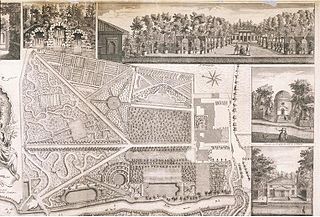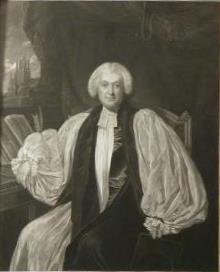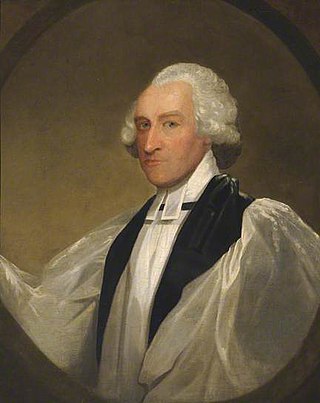Edward Maurice was an Anglican bishop in Ireland, Bishop of Ossory from 1755 to 1756 [1] He was educated at Trinity College, Dublin, after which he was Rector of Armagh. He died on 11 February 1756. [2]
Edward Maurice was an Anglican bishop in Ireland, Bishop of Ossory from 1755 to 1756 [1] He was educated at Trinity College, Dublin, after which he was Rector of Armagh. He died on 11 February 1756. [2]
The Lord High Chancellor of Ireland was the highest judicial office in Ireland until the establishment of the Irish Free State in 1922. From 1721 to 1801, it was also the highest political office of the Irish Parliament: the Chancellor was Speaker of the Irish House of Lords. The Lord Chancellor was also Lord Keeper of the Great Seal of Ireland. In all three respects, the office mirrored the Lord High Chancellor of Great Britain.

John Rocque was a French-born British surveyor and cartographer, best known for his detailed map of London published in 1746.

Bishop John Hinchliffe DD was an English churchman and college fellow. He was Master of Trinity College, Cambridge, 1768–88, Bishop of Peterborough, 1769–94, and Dean of Durham, 1788–94.

James Yorke was a British clergyman.

William Smith was an Episcopal priest who served as the first provost of the College of Philadelphia, which became the University of Pennsylvania. He was also the founder of Washington College in Chestertown Maryland, and St. John's College in Annapolis, Maryland.

The Bishop of Ardagh was a separate episcopal title which took its name after the village of Ardagh, County Longford in the Republic of Ireland. It was used by the Roman Catholic Church until 1756, and intermittently by the Church of Ireland until 1839.

The United Dioceses of Dublin and Glendalough is a diocese of the Church of Ireland in the east of Ireland. It is headed by the Archbishop of Dublin, who is also styled the Primate of Ireland. The diocesan cathedral is Christ Church Cathedral, Dublin.
Events from the year 1818 in Ireland.
Events from the year 1680 in Ireland.
Brinsley Butler, 2nd Earl of Lanesborough, PC (Ire), styled The Honourable until 1756 and Lord Newtown-Butler from 1756 to 1768, was an Irish politician and peer.

Matthias Mawson was an English clergyman and academic who served as Master of Corpus Christi College, Cambridge and subsequently as Bishop of Llandaff, Bishop of Chichester, and Bishop of Ely.

Robert Jocelyn, 1st Viscount Jocelyn PC (I) SL was an Anglo-Irish politician and judge and member of the Peerage of Ireland, best known for serving as Lord Chancellor of Ireland.

Thomas Barnard was an Anglican clergyman who served in the Church of Ireland as Bishop of Killaloe and Kilfenora (1780–1794) and Bishop of Limerick, Ardfert and Aghadoe (1794–1806).
John Law (1745–1810) was an English mathematician and clergyman who began his career as a Fellow of Christ's College, Cambridge, and went on to become chaplain to the Lord Lieutenant of Ireland and Church of Ireland bishop of Clonfert and Kilmacduagh (1782–1787), Killala and Achonry (1787–1795), and finally of Elphin (1795–1810).
Thomas Marlay was an Irish politician and judge, who ended his career as Lord Chief Justice of Ireland. He is remembered chiefly for beginning the rebuilding of Celbridge Abbey, and as the grandfather of the statesman Henry Grattan.

Robert Clayton (1695–1758) was an Irish Protestant bishop, now known for his Essay on Spirit. In his own lifetime, he was notorious for his unorthodox beliefs, which led his critics to question whether he could properly be called a Christian at all, and at the time of his death, he was facing charges of heresy.

William Preston, D.D. was an Irish Anglican bishop.
Robert Johnson was an Anglican bishop in Ireland during the mid-18th century.
Henry Cary (1717–1769) was the last surviving child of Rev Mordecai Cary, D.D., Bishop of Killala (1687–1751) and Catherine Courthorpe.
Sir Samuel Synge-Hutchinson, 3rd Baronet was a 19th-century Anglican priest in Ireland.